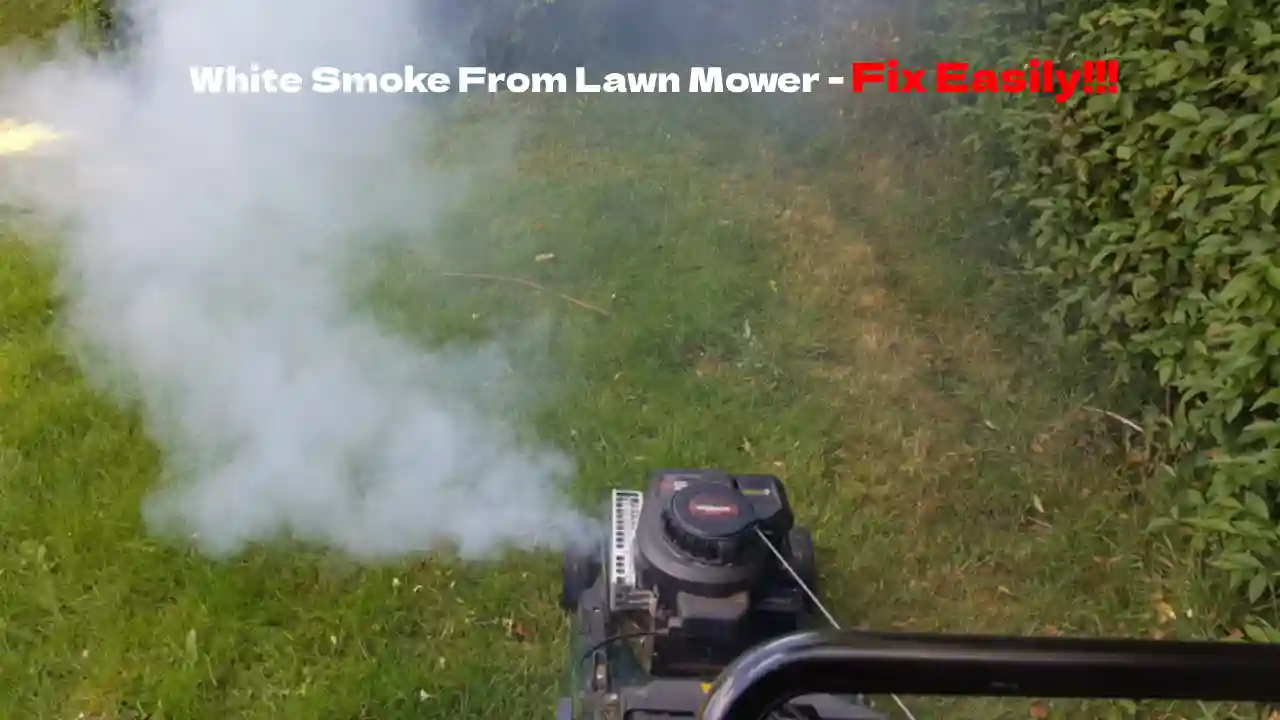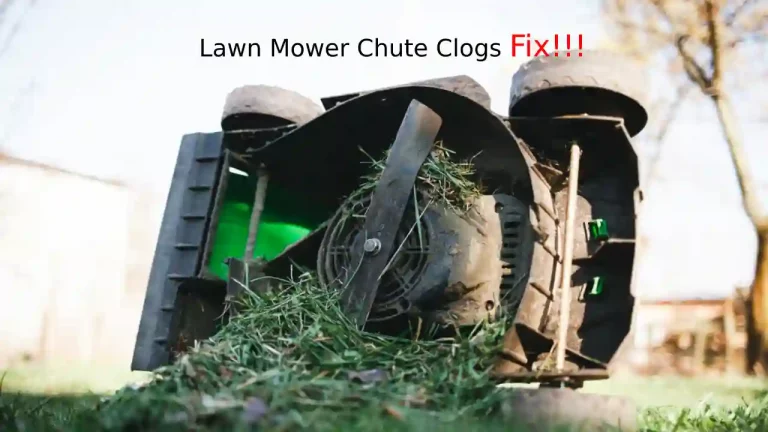Freshly cut grass always evokes great memories as it welcomes in the new season. There is very little as alarming as white smoke suddenly ballooning out of the lawnmower; this is particularly true if you are in the middle of a cut.
The reason your lawnmower is smoking white may include
- The mower being tipped at too great an angle.
- The engine being overfilled with oil, a carburettor fault.
- Faulty crankcase breather.
- A head gasket failure.
- An engine that is worn out and needs to be rebuilt.
When your lawnmower engine shows an unusual symptom or develops a specific fault, a great rule to follow is that you only repair one of the suspected issues at a time. If that isn’t effective, move on to the next one, and so on until the problem is fixed.
Lawn Mower Smokes White – Fix Easily in Seconds
All sorts of irrational thoughts start running through your mind the minute you notice white smoke billowing from the lawnmower; is the motor blown?
Where can I get a good deal on a new lawnmower? Will it seize if I carry on? How am I going to cut the lawn?
The first piece of advice is to calm down and think through the problem rationally. In most instances, white smoke is caused by unburnt oil flowing onto a scorching surface like the exhaust.
Your investigation should first consider this possibility. Let’s look at the different causes and the fixes.
The Lawn Mower Is Tipped At Too The Great An Angle
If the operator tips the lawnmower at too great an angle, vast clouds of smoke will billow out.
Perhaps the operator is mowing at a very steep slope, is angled when servicing, or just checking the lawnmower; oil enters the cylinder and gets ejected through the exhaust port and onto the muffler.
The unburnt oil is burnt and immediately produces clouds of smoke.
The fix is straightforward, roll the lawnmower onto a level surface, start it, and let the engine run for 2-3 minutes to burn off any oil that may have found its way to the engine.
More than likely, this will be the solution, and you can carry on using the lawnmower with no further issue.
To prevent this from reoccurring, if you must tilt the mower, either to check underneath it or to mow a steep bank, always make sure the side with the air filter is highest.
The Engine Being Overfilled With Oil
Before starting your lawnmower, checking the oil level with the dipstick is a good habit if the level is above the “MAX,” mark empty the excess oil before starting the engine.
Suppose you mistakenly fill the oil tank up past the manufacturer’s recommended point. In that case, it is potentially more severe than it first sounds, and the symptoms/ damage of an overfilled tank could be.
- White smoke pours out of the muffler
- The lawnmower engine can overheat
- The lawnmower can be hard to start
- If too much oil pours into the crankcase, the oil tank will overflow, affecting how the crankcase functions.
In this condition, too, much oil reaches the crankcase of the lawnmower, and it causes the oil sump to overflow.
The fix is obvious, drain out the excess oil; this sounds easier than it is, and not having the right equipment can be a real hassle.
I recommend acquiring a purpose-made lawnmower oil extraction pump, such as this example.
A Faulty Carburettor Could Cause Your Lawnmower To Smoke
If the gasket which seals the connection between the carburetor and the engine is faulty, fuel could leak into the oil.
If this has happened, the dipstick may show an increase in the oil level, and the oil may smell a little like gas.
You mustn’t start the engine in this condition as the gas will have diluted the oil, making it less effective.
If the lawnmower engine emits smoke like a dragon and then lies down and plays dead, oil has probably entered the jet, which modulates the gas feed and is blocked.
If you are comfortable with your ability, replacing the gasket and jets is not difficult. Alternatively, consider replacing it with a new unit if the carburetor looks a bit worse for the wear.
The Lawnmower Emits Smoke Due To A Head Gasket Failure
A blown head gasket is not a common occurrence in lawnmowers; however, the repair is more complex and expensive if it does happen.
The head gasket in a lawnmower is essentially an oversized washer that separates the cylinder head from the engine block. While it prevents oil from leaking out, its primary function is the seal that enables sufficient pressure to be built up in the piston chamber.
If the gasket is badly damaged, insufficient pressure (compression) in the piston chamber will enable the internal combustion process.
If the gasket is damaged or the cylinder head is not tightened correctly, the oil will leak into the piston chamber, which burns, and white smoke is generated through the exhaust.
Replacing a lawnmower head gasket is not tricky; however, if you don’t have the experience or tools (such as a Torque Wrench), let a qualified technician do this for you.
The Lawnmower May Have A Faulty Crankcase Breather
A lawnmower crankcase breather releases pressure in the crankcase, allowing excess air forced down by the pistons’ movement to escape.
A blocked crankcase breather forces excess oil into the cylinder, where it burns off and sends smoke through the exhaust.
The color of the smoke is an excellent gauge of the degree of the problem. If the smoke is white, the problem is new, and as the smoke slowly changes color to black, the situation worsens.
A dirty, clogged, or damaged crankcase breather could cause the engine to seize, so it is a worthwhile check to make.
The typical mounting point for a lawnmower crankcase breather is on the crankcase itself.
Cleaning or replacing the Faulty Crankcase Breather is not difficult; however, it does require some dismantling of the engine. If you are not confident in your skillset, a qualified technician may handle it better.
A Worn-Out Engine May Cause White Smoke
The smoke clouds may result from the engine being worn out and the manufactured tolerances being exceeded.
Engines in this condition can be rebuilt, with the cylinder rebored, new piston rings, and possibly new pistons and gaskets installed.
If the lawnmower powered by the engine is very old, it may be time to call it a day and purchase a new machine. The costs of a rebuild probably exceed the lawnmower’s value, and additionally, with a new machine, you get the confidence of warranties, etc.
Conclusion
As alarming as clouds of white smoke are, the actual causes may be straight forward to resolve at no cost.
There are more severe issues that can cause smoke, and these can be costly to fix; the possibility of this being the case is minimal.
Wondering how to adjust lawn mower engine valve, check out this post.







